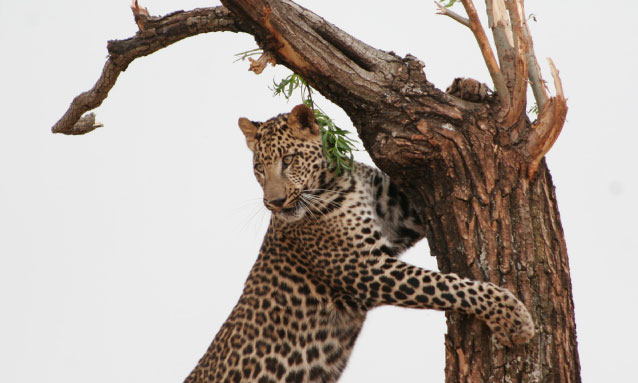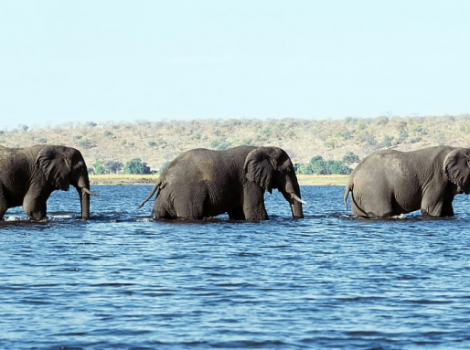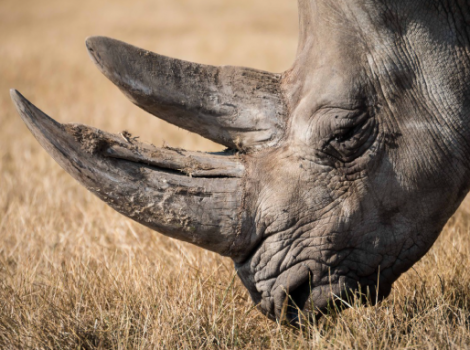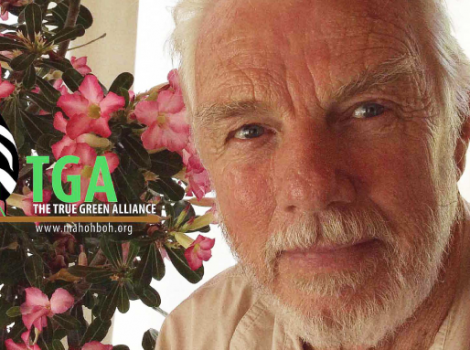
Wildlife tourism is an important segment of Botswana’s tourism industry, representing 80% of the total annual revenue of trips to Botswana. Key to this are protected areas, which have led to the growth of the country’s wildlife tourism.
Wildlife tourism can take place either in the animals’ natural environments such as national parks, game reserves or other protected areas or in captivity, such as rehabilitation centres. Activities during these tours can be classified into two main groups; non-consumptive (viewing and photographing of wild animals) and consumptive, which refers to activities such as trophy hunting and fishing.
Since the start of trophy hunting operations in 1996 in Botswana, trophy hunting has grown steadily. The industry employed an estimated 1,000 people, received 350 hunters annually and sold over 5,500 hunting days per year.
In 2011, a year before the trophy hunting ban was announced in the country, the industry netted Botswana US$20 million in revenue annually from 2,500 animals sold to trophy hunters. Botswana specialised in big game such as elephants, buffalo and leopard which, generated higher hunting fees from few animals.
The main reason given by the Botswana government for the trophy hunting ban was the decline in the number of wildlife due to trophy hunting – a reason that was widely questioned by trophy hunting operators. The ban on trophy hunting had an adverse impact as highlighted by various data sources. In 2018, we, therefore, set out to study the impact of the ban on trophy hunting on local communities.
We chose two communities, Sankuyo (400 inhabitants in Northern Botswana) and Mmadinare (12,000 inhabitants in Eastern Botswana), both of which had prior involvement in hunting. We collected data through interviews with community members and leaders of the community-based trusts. These are legal entities established to represent the interests of communities and are often made up of multiple villages of close geographical proximity.
We also interviewed former employees from the hunting sector and small business owners. Some of the questions asked were: how did hunting tourism benefit the community? Was hunting seen as a positive impact on the community? What are the current challenges that the community faces since the ban? Have attitudes toward wildlife changed from the times of trophy hunting?
Human-Wildlife Conflict
Participants said they’d lost income as a result of the trophy hunting ban. The study didn’t focus on determining how much or what percentage was lost. Participants said the ban also led to more instances of human-wildlife conflict. In addition, community members said wild animals were a risk to their livelihoods as they were a danger to livestock and crop production. The 2016 Review of Community Based Natural Resources Management in Botswana indicated that the three most important livelihood sources for communities were livestock, social welfare and crops. This can undermine conservation efforts, especially if the benefits of co-existing with wildlife are minimal.
Our findings also revealed both communities were outraged that they weren’t consulted on the trophy hunting ban in 2014. One of the participants, a business owner, said;
“Aah, I don’t know I just heard them saying it will be the last hunting season and they didn’t explain why.”
Another participant, a former hunting employee, reiterated the business owner’s sentiments;
“What I remember is them informing us that hunting is being stopped. As for asking for our opinions, I don’t remember them coming to do that.”
The results of the study also showed that the two communities experienced the benefits of trophy hunting differently. Community tourism benefits from trophy hunting are more pronounced in smaller communities.
In Sankuyo community members, former hunting employees and small business operators all said that they benefited through employment contribution, the sale of meat, as well as financial contribution to community development. But in Mmadinare, the larger of the two communities, the members felt they didn’t benefit that much from trophy hunting. However, some former hunting employees did mention benefits such as sale of meat, employment and skills development.
The study found that both communities experienced challenges as a result of the ban on trophy hunting. The participants decried a spike in the number of wildlife in the areas and expressed that this has led to the escalation of Human-Wildlife Conflict, which mainly involves elephants, kudus, antelopes and buffaloes invading their farms.
A former hunting employee in Sankuyo said;
“In the past, because of trophy hunting, it was not easy to see animals around. Nowadays, they are everywhere, sometimes we see them in our yards.”
Consequently, almost half of the participants (47.8%) in both communities highlighted they had negative attitudes towards wildlife as a result of the Human-Wildlife Conflicts escalating. This puts the sustainability of wildlife resources in jeopardy.
Last year, Botswana Parliament passed a motion to lift the ban on elephant hunting, which had been in place since 2014. This will only allow the hunting of elephants. Hunting licenses were auctioned in February 2020 as elephants were seen as the main contributors to animal and conflicts in certain areas.
Our research supports this, and further recommends the lifting of the ban on the remaining animals listed under the ban. This can help to alleviate challenges experienced by households in communities like Sankuyo, where trophy hunting was a key source of income. The lifting of the ban will also reverse the negative attitudes within communities that threaten conservation efforts.
Authors: Peet Van Der Merwe – Professor in Tourism, North-West University Lelokwane Lockie Mokgalo – Lecturer, Botswana Accountancy College
Disclosure Statement: The authors do not work for, consult, own shares in or receive funding from any company or organisation that would benefit from this article, and have disclosed no relevant affiliations beyond their academic appointment.
Partners: The Conversation is funded by the National Research Foundation, eight universities, including the Cape Peninsula University of Technology, Rhodes University, Stellenbosch University and the Universities of Cape Town, Johannesburg, Kwa-Zulu Natal, Pretoria, and South Africa. It is hosted by the Universities of the Witwatersrand and Western Cape, the African Population and Health Research Centre and the Nigerian Academy of Science. The Bill & Melinda Gates Foundation is a Strategic Partner. Click for more.



